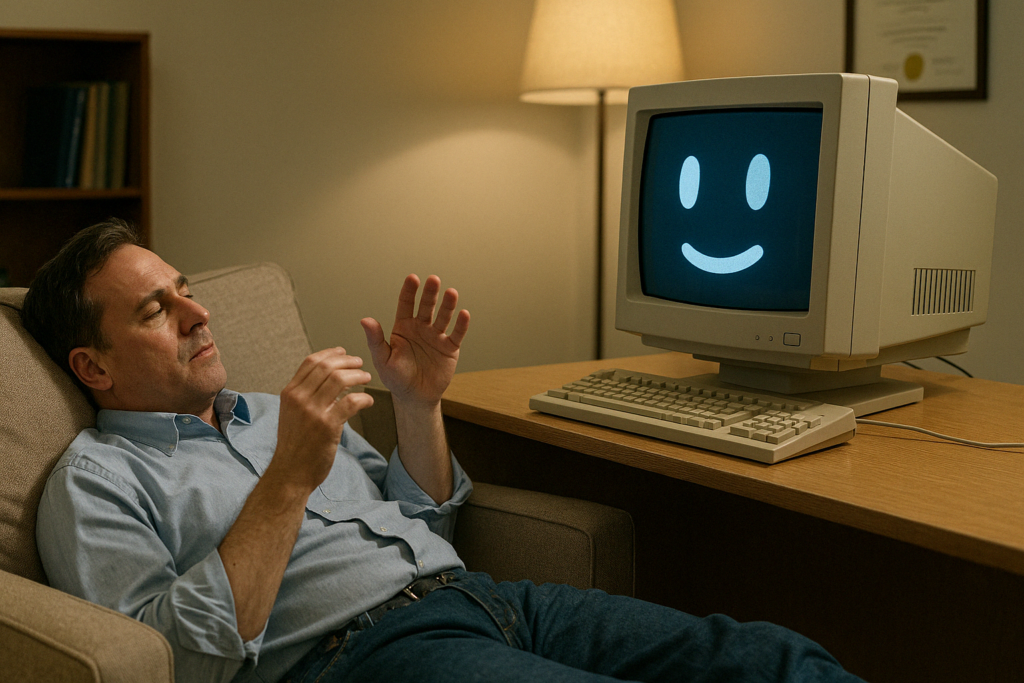Turns out, the most empathetic ‘person’ on your team might be a chatbot.
I was recently working with a company exploring ways to support employee mental health as a way to increase employee engagement. Their HR lead put it bluntly:
“Our EAP (Employee Assistance Program) is a ghost town, and no one wants to be the first to raise their hand in front of their manager.”
And she’s not wrong. Statistically, she’s spot on. Studies show that up to 40% of employees experience stress, anxiety, or depression, yet fewer than 7% use their company’s traditional EAP. The programs look solid on paper, but in reality? Most employees would rather push through the pain than push the “request help” button.
So the company was piloting something new: an AI-powered therapy app. A chatbot employees could text at 11 p.m. when their thoughts about the morning progress report were spiraling. One that never judged, never sighed, never made them fill out a form first. It was like having a CBT-trained therapist in your pocket, disguised as a penguin, robot, or digital best friend. Basically, the only team member who says “How are you?” and actually waits for an answer.
AI therapy tools are reshaping how employees access mental health support.
They’re not here to replace human therapists, but they are bridging the gap between needing help and actually asking for it. When implemented well, they become a powerful ally in your Culture of Connection™ with your teams.
Platforms like Woebot, Wysa, and Youper are leading the charge. These apps use conversational AI grounded in cognitive behavioral therapy (CBT) to check in with employees, guide them through stress-management techniques, and even flag when someone may need more serious support.
Woebot, for example, was developed at Stanford and has been shown in studies to significantly reduce symptoms of anxiety and depression in just two weeks. It’s like an AI CBT coach, with a dashboard HR can use to spot anonymous trends across the team.
Wysa, used by companies like Accenture and Colgate-Palmolive, blends AI chatbot support with the option to escalate to a human therapist if needed. It’s currently in use across 65 countries and even received FDA Breakthrough Device designation for mental health care in chronic pain patients.
And then there’s Youper, which focuses on mood tracking and mindfulness. It doesn’t offer human escalation, but its journaling prompts and personalized coping tools have been associated with an 83% user improvement rate, according to a Stanford University study. Youper’s vibe is part therapist, part journal, part emotional Fitbit.
For companies, these tools are..
- Low-cost
- Scalable
- Easy to integrate into benefits portals.
Some, like Wysa, are even available through major benefits platforms like PlanSource and PEOs like Resourcing Edge, meaning even smaller employers can offer robust mental health support at scale.
If your EAP is gathering dust and your team’s Slack channel has become a digital therapy session, it might be time to explore AI therapy tools. These apps won’t solve every mental health challenge, but they’re a scalable way to support emotional well-being, especially for the folks who won’t raise their hand but will text a penguin in the dark.
Mental health isn’t one-size-fits-human.
In the age of remote work, burnout, and “I’m fine” autopilot, leaders need to offer tools that meet people where they are, even if that place is 3 a.m. on their couch. Or under a weighted blanket, eating cereal out of a coffee mug. The future of employee support might just sound like a chatbot… and that might not be a bad thing.




